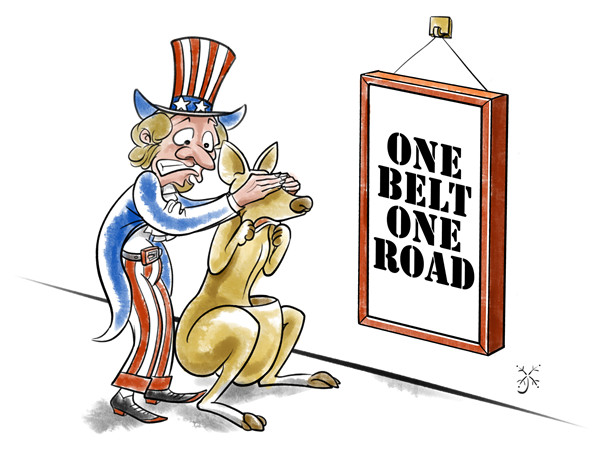




Australia has been vacillating over strengthening its ties with China, seemingly unsure of whether that will somehow compromise its security or bring welcome economic benefits. Yet while there is nothing to suggest China is a threat to Australia, they do have complementary economic structures and Canberra's plans to develop northern Australia and Australia's infrastructure could make great progress through cooperation with China's Belt and Road Initiative (the Silk Road Economic Belt and 21st Century Maritime Silk Road).
However, Canberra's suspicions about China's intentions mean it views the Belt and Road Initiative and the Asian Infrastructure Investment Bank as tools for China to expand its geopolitical power in the Pacific Rim through trade. And it fears that participation in the Belt and Road Initiative might harm its alliance with the United States.
Since US President Donald Trump took office in 2017, the US has sought to enhance its position of power worldwide, not least by strengthening its Asia-Pacific alliance network, which includes Australia, as a means to project its power and contain China's influence. The US and Australia, based on similar ideologies and culture, have formed close US-Australia relations, which has prompted Canberra to keep pace with Washington in its stance toward China.
Its alliance with the US has been the primary foundation of Australia's national security and that has the most influence on Australian attitudes toward China. Canberra does not want China to impact on the US-led order in the Pacific Rim and its own interests as an ally of the US.
Canberra wants the US to maintain its dominance in the Asia-Pacific, particularly militarily and politically, so it can act as a brake on China's increasing influence. In return it is giving up the economic potential that could be realized through cooperation with Beijing, for example, a new project connecting China's Belt and Road Initiative and Australia's infrastructure investment.
However, in consideration of the considerable benefits that could be gained from strengthening its cooperation with Beijing, Canberra cannot turn its back on all cooperation with China. Instead, it has been making efforts to rebalance its relations with the US and China.
Beijing-Canberra ties have been greatly improved in the past years, and they have developed a comprehensive strategic partnership and established a free trade zone. It has therefore been a natural counterbalance for Canberra to cool down bilateral relations as part of its strategic adjustments to balance its diplomatic relations between different countries.
At the same time, the conservative Liberal Party-led coalition in power needs to present a strong attitude in order to bolster its support.
The coalition has tended to oppose the Belt and Road Initiative in a bid to appeal to the rising populist and protectionist sentiment in Australia and thus win more approval.
Australia, so far, has been relatively positive about cooperation with China with regard to trade, tourism and education, but less enthusiastic with regard to diplomacy, security and immigration for political reasons. Canberra should realize that China has been making firm efforts to seek fair cooperation and mutual benefits. And China will continue to pursue friendly relations and mutual benefits.
The author is an adjunct researcher at the Institute of Australia, China University of Mining and Technology.
If you have any problems with this article, please contact us at app@chinadaily.com.cn and we'll immediately get back to you.